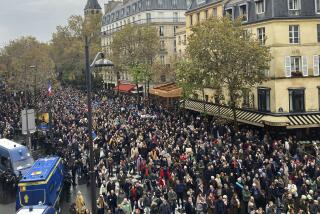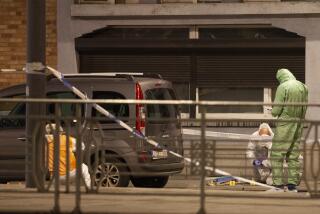300,000 Protest Belgium’s Handling of Pedophile Case
- Share via
BRUSSELS — Capping an extraordinary week of public demonstrations, about 300,000 people marched through the streets of the Belgian capital Sunday to protest the authorities’ handling of a highly charged pedophile scandal and to draw attention to the unknown fate of about 10 missing children.
“I want to thank everyone here for paying homage to our little princess,” Carine Russo, mother of an 8-year-old girl who was allegedly raped and slain by a convicted pedophile, told the solemn assembly. “I ask only one thing, that all children in the world are treated like little princes and princesses and never know . . . hell on Earth.”
Authorities said the orderly and sometimes teary crowd, carrying white flowers and balloons as symbols of innocence and purity, was among the largest in Belgian history. It surpassed the size of protests during the tense Cold War years of the early 1980s, when peace activists across Europe took to the streets to oppose the deployment of U.S. missiles on the Continent.
This time, however, most of the marchers were first-time protesters moved by their hearts, not by their politics--mothers, fathers, teenagers and young children horrified by an unfolding case of murder and child pornography that has gripped the country since August.
Even veterans of other demonstrations--including the legendary social upheavals of 1968--said none carried the moral grounding and genuine grass-roots concern that presided at Sunday’s event like the guiding hand of a watchful parent.
“To be here gives you a strange feeling in your heart,” said Hafida Zouid, a Brussels mother who made the four-hour march with her 4-year-old daughter. “What happened to those children has given us all goose bumps. This is the only way we know how to express our feelings.”
During a short address at the start of the rally, Nabela Benaissa, whose young sister has been missing for four years, quietly captured the gravity of the moment when she tucked away her intended speech.
“I had a thousand things to tell you, but my emotions are too strong,” she said. “We had a little bird that we loved, and one day she left the nest, and since then we have been waiting for her to come back.”
Four girls were slain, two others rescued alive and about 10 children are still missing in connection with a child pornography ring allegedly headed by convicted child rapist Marc Dutroux, who police say committed his most recent crimes after being released from prison early because of good behavior.
The Dutroux case has haunted the consciences of ordinary Belgians since it was disclosed that two of the victims starved to death in an underground dungeon nine months after disappearing near their homes and despite repeated public appeals by their parents for an aggressive campaign to find them.
But the inward questioning has been increasingly overshadowed by intense rage toward the country’s political and judicial systems, which have come under scrutiny because of allegations of incompetence, corruption and complicity in the pedophile case. Recently, there have been reports in the Belgian media that investigators are pursuing evidence that might link senior political figures to Dutroux.
The enormous public anger began spilling into the streets last week when a respected state investigator was removed from the case by the country’s top court.
It was ruled that investigating magistrate Jean-Marc Connerotte, who was instrumental in Dutroux’s arrest in August, had compromised his impartiality by accepting a spaghetti dinner and a fountain pen during a fund-raising event last month for families of missing children.
The decision, defended by many legal experts as following the letter of the law, set off a flurry of spontaneous protests by ordinary people, who saw Connerotte as one of the few heroic players in the affair and the court ruling as evidence of a judicial system out of step with real justice.
Auto workers blocked roads. Bus drivers refused to drive. Postal workers delivered sacks of spaghetti to judicial officials. And firefighters in Liege, where much of the scandal has been centered, turned their water jets on the Palace of Justice.
“When justice goes bad, people have to do what they have to do, just like in the old times,” said Johan, a 28-year-old unemployed construction worker who would not give his last name because he is related to a main suspect in the pedophile case.
“If you are going to rule by the letter of the law, then it should be that way for everyone, not just working Belgians with no political connections.”
The political fallout has not been lost on the country’s rulers. In a rare break with accepted protocol limiting his involvement in politics, Belgian King Albert II hosted a seminar on child abuse Friday, during which he called for a “moral revival and a profound change in our country.”
After the rally on Sunday, Prime Minister Jean-Luc Dehaene met with leaders of the protest, promising to push for several significant reforms in the Belgian justice system that could make a repeat of the Dutroux affair less likely, including depoliticizing the method for choosing magistrates.
The prime minister also pledged that the Dutroux investigation will be pursued “to its end” without any political interference and that disciplinary action will be taken against anyone found to have bungled the case.
The political reaction was politely welcomed by parents of the missing and dead children, but it was seen as too little and too late.
“We won’t stop until there is a change in the mentality of the public, which is already happening, and especially among the people who are making decisions about our children,” Russo, whose daughter starved in the dungeon, said in an interview.
“This is all about our children and about citizens who have at last realized they need to express themselves as citizens.”
More to Read
Sign up for Essential California
The most important California stories and recommendations in your inbox every morning.
You may occasionally receive promotional content from the Los Angeles Times.













